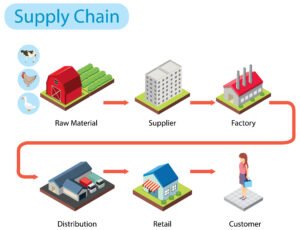In today’s rapidly evolving digital landscape, managing finances effectively is critical for businesses to maintain profitability, ensure compliance, and drive sustainable growth. With increased competition and the demand for greater transparency, organizations need financial systems that offer more than just basic accounting. They require solutions that deliver real-time insights, streamline financial operations, and provide agility to adapt to changing market conditions.
Microsoft Dynamics 365 Finance is a powerful financial management solution designed to meet the needs of modern businesses. With its advanced capabilities in financial reporting, budgeting, cash flow management, and regulatory compliance, Dynamics 365 offers a comprehensive platform that goes beyond traditional finance software. By integrating with other Dynamics 365 applications, it creates a unified environment for managing not only finances but also operations, sales, and customer engagement.
This article explores how Dynamics 365 Finance transforms financial management for businesses, offering insights into its features and how they can drive efficiency and strategic decision-making. We’ll discuss its role in automating financial processes, improving cash flow visibility, ensuring compliance, and offering detailed analytics for better financial planning.
Automating Financial Processes for Increased Efficiency
One of the key advantages of Dynamics 365 Finance is its ability to automate routine financial processes, reducing manual intervention and the risk of human error. Automation simplifies tasks such as accounts payable, accounts receivable, invoicing, and expense management, freeing up valuable time for finance teams to focus on more strategic activities.
For example, businesses can set up automated workflows for approvals, invoice processing, and payment reminders, ensuring that transactions are processed in a timely manner without delays. Automation also reduces the time spent on month-end closing processes by automating journal entries, reconciliations, and adjustments. This improves overall accuracy and ensures financial data is up-to-date, providing a clearer picture of the company’s financial health.
Additionally, automated systems can help organizations manage compliance with tax regulations by automatically calculating taxes based on current laws and generating reports that are ready for submission to tax authorities. This reduces the burden on finance teams and minimizes the risk of errors in compliance reporting.
Enhancing Cash Flow Management and Forecasting
Cash flow management is the lifeblood of any organization, and poor cash flow visibility can lead to financial difficulties or missed opportunities. Dynamics 365 Finance offers businesses the tools to monitor and manage cash flow in real-time, providing insights into cash positions, liquidity, and projected cash inflows and outflows.
The system integrates data from various departments, such as sales, procurement, and production, to deliver an accurate and comprehensive view of cash flow. This allows finance teams to track outstanding payments, manage debt, and optimize cash reserves. Furthermore, its forecasting capabilities enable businesses to project future cash flow based on historical data and current trends, empowering them to make informed decisions regarding investments, expenditures, and financial planning.
Accurate cash flow forecasting helps organizations avoid liquidity crises, negotiate better terms with suppliers, and optimize working capital. By offering real-time insights into cash flow, Dynamics 365 ensures that businesses can maintain the necessary cash levels to meet short-term obligations while planning for long-term growth.
Streamlining Financial Reporting and Analysis
Timely and accurate financial reporting is essential for decision-making at all levels of an organization. Dynamics 365 Finance provides robust financial reporting capabilities that allow businesses to generate a wide range of reports—from income statements and balance sheets to detailed segment reporting and performance metrics.
With its built-in analytics and reporting tools, Dynamics 365 enables finance teams to easily create customizable reports tailored to the specific needs of different stakeholders, whether they are executives, department heads, or external auditors. These reports can be generated in real-time, allowing for faster decision-making and improved transparency across the organization.
Additionally, the system’s integration with Microsoft Power BI enhances financial reporting by allowing users to create interactive dashboards and visualizations. This makes it easier to analyze financial data, spot trends, and identify potential areas for improvement. By providing both high-level overviews and granular details, Dynamics 365 empowers businesses to make data-driven decisions that optimize financial performance.
Ensuring Compliance and Risk Management
In a world of increasing regulatory complexity, maintaining compliance with financial reporting standards, tax regulations, and other legal requirements is critical. Dynamics 365 Finance helps businesses stay compliant by offering built-in regulatory compliance features that automatically update with changes in local and international laws.
The system also supports multi-currency and multi-entity financial management, enabling businesses to operate globally while adhering to regional tax codes and financial reporting standards. Dynamics 365 generates audit trails for all financial transactions, ensuring that every action is traceable and documented, which is essential for both internal and external audits.
Beyond compliance, the system’s risk management features allow businesses to assess and mitigate financial risks. With real-time data on currency fluctuations, interest rate changes, and credit exposures, finance teams can take proactive steps to minimize risks and protect the organization from unforeseen financial disruptions. Dynamics 365’s compliance and risk management tools ensure that businesses can operate confidently, knowing that they are meeting regulatory requirements and managing risks effectively.
Improving Budgeting and Financial Planning
Effective budgeting and financial planning are crucial for organizations looking to allocate resources efficiently and meet their financial goals. Dynamics 365 Finance offers powerful tools for creating, managing, and analyzing budgets across departments, projects, and business units.
The system allows businesses to develop detailed budgets based on historical data, current financial conditions, and projected growth. Finance teams can create multiple budget scenarios to assess how different strategies might impact the company’s financial health. This scenario planning capability is especially valuable in uncertain market conditions, as it helps organizations prepare for potential financial challenges or opportunities.
Moreover, Dynamics 365’s integration with other business functions enables cross-departmental collaboration on budget creation, ensuring that financial plans align with broader organizational goals. By providing real-time tracking of actual performance against budgeted figures, the system allows businesses to monitor progress and make adjustments as needed.
Optimizing Financial Consolidation for Multi-Entity Businesses
For organizations with multiple subsidiaries, divisions, or business units, financial consolidation can be a complex and time-consuming process. Dynamics 365 Finance simplifies this process by automating financial consolidation across multiple entities, currencies, and regulatory frameworks.
The system supports intercompany transactions, eliminating the need for manual reconciliations between entities. This ensures that consolidated financial statements are accurate and up-to-date, providing a clear picture of the overall financial health of the organization. Dynamics 365 also allows businesses to generate consolidated reports in various currencies and according to different accounting standards, making it easier to manage global operations.
By streamlining the financial consolidation process, Dynamics 365 reduces the administrative burden on finance teams and ensures that consolidated reports are delivered in a timely manner. This is especially important for organizations that need to report their financial performance to investors, regulatory bodies, or parent companies.
Managing Fixed Assets and Depreciation
Managing fixed assets is an essential part of financial management, particularly for businesses with significant investments in property, equipment, and machinery. Dynamics 365 Finance offers comprehensive fixed asset management capabilities, allowing businesses to track the lifecycle of their assets—from acquisition and depreciation to disposal.
The system automatically calculates depreciation based on predefined schedules and accounting rules, ensuring that asset values are accurately reflected in financial statements. Finance teams can easily track asset movements, such as transfers between locations or business units, and generate reports on asset performance and maintenance costs.
By providing visibility into the value and condition of fixed assets, Dynamics 365 helps businesses make informed decisions about asset maintenance, replacements, and investments. This reduces the risk of unexpected asset failures and ensures that businesses can maximize the return on their capital investments.
Enhancing Financial Transparency with Role-Based Access
Financial transparency is critical for maintaining trust and accountability within an organization. Dynamics 365 Finance offers role-based access control, ensuring that employees have access to the financial data they need while protecting sensitive information.
Finance teams can set permissions based on roles, departments, or individual employees, ensuring that only authorized personnel can view or edit specific financial data. This not only enhances security but also improves accountability by tracking who has accessed or modified financial records.
By offering granular control over data access, Dynamics 365 ensures that financial information is protected while promoting transparency across the organization. This fosters a culture of accountability and trust, which is essential for effective financial management.
Conclusion
Financial management requires more than just traditional accounting practices in the digital age. Microsoft Dynamics 365 Finance offers a comprehensive solution that integrates advanced technologies to automate processes, improve cash flow visibility, ensure compliance, and provide real-time insights. By leveraging Dynamics 365, businesses can streamline their financial operations, enhance decision-making, and remain agile in an increasingly competitive market.
The ability to automate tasks, generate detailed financial reports, and manage budgets effectively allows organizations to focus on strategic growth rather than getting bogged down in manual financial processes. As businesses continue to evolve in the era of digital transformation, Dynamics 365 Finance will remain a critical tool for driving financial success and maintaining a competitive edge.








